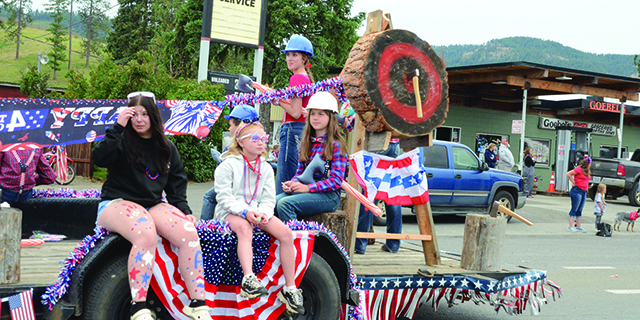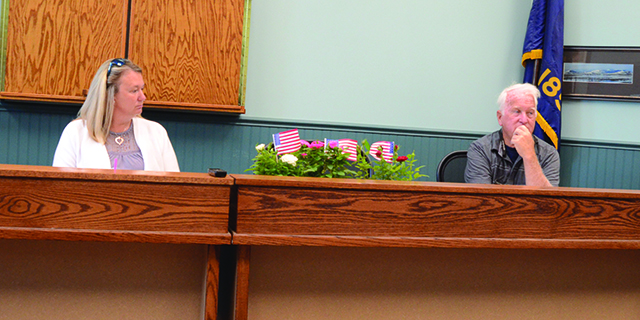Main Street: Who wants this war? and why?
Published 5:00 pm Wednesday, October 16, 2002

- Rich Wandschneider
“Letters received in the last week: 753; published: 78. For the fourth week in a row, the Bush administration’s push for war against Iraq drew the most letters, with 190. Only 18 supported possible military action, and four of those 18 letters came from the same person.”
– The Oregonian,
Trending
October 6, 2002.
I’ve been puzzling over this war and who wants it and why they want it for weeks getting on months. The Oregonian’s statistics match what I hear around town and further. Although Saddam Hussein doesn’t have any or many American fans, most people are not ready to jump into a war with Iraq – at least not unilaterally. After spending a few weeks touring the United States, NY Times columnist Thomas Friedman put it this way: most Americans don’t like Saddam Hussein at all, but they also think that he loves life more than he hates America. They are more worried about the terrorists who hate America more than they love life, i.e., people who would blow themselves up on airplanes or in suicide bombings of the kind that occurred in Bali this week.
Still, President Bush got his endorsements from both houses of Congress, and lobbying for a free hand with intervention in Iraq with United Nations partners is in high gear. And despite the letters to the editor and the growing number of campus and city demonstrations against war, the “broad support” for the President’s handling of Iraq is at 60 percent, according to Pew pollsters (interestingly, it drops below 40 percent when the question of “unilateral” intervention is posed). Another interesting fact: Two-thirds of the American public thinks that Saddam Hussein was directly involved in the September 11 attack.
Although almost 100 percent of Americans seem to know that Saddam is a very bad character, even the President’s own men have not been able to make that direct linkage.
Again, how to make sense of these mixed messages? I was driving back from the Pendleton airport on Tuesday morning and caught a talk show tackling the question. One of the participants on the show was the Pew pollster; another was a political scientist from Georgetown University; and a third was an avowed anti-war organizer. They didn’t answer all of my questions, but there were more clues.
The demographics issue was the most interesting. According to the pollster, although there are increasing numbers of demonstrations on campuses, young people are far and away the most supportive of intervention. And the over 65s are the most opposed. At this point the political scientist stepped in and added that the older people are more concerned with casualties, and they believe that large numbers of casualties – American and Iraqi – are likely. Younger Americans are confident that we can have another Granada, Panama, Gulf War, or Afghanistan, where casualties – at least American casualties – will be light.
Trending
Younger Americans, at least until the shock of September 11, had not really lived with war casualties (except for the few who have explored the issue of Iraqi casualties in the Gulf War or Afghani casualties in our overthrow of the Taliban). And for this generation it is a real stretch to Vietnam, Korea, and WW II.
And what about the draft? The political scientist pointed out that Vietnam was at first a popular war, that volunteerism was high, in part because enlistees had fathers and older brothers who had fought what they felt were meaningful fights in Europe and Asia. It was only as the war in Vietnam became hard, and the stakes seemed so unrelated to America’s own security and so much an internal Vietnamese issue that the anti-war forces mobilized. In the current situation, where young people have no direct relationship to war, the effect of September 11 is huge. It was a personal threat, and is becoming a personal challenge. As there is “the itch.” I can think of no better word for it. This notion that the only real way to prove manhood (or, with the new military including so many women, “adulthood”) is to go to war. How else to account for the popularity of Private Ryan and Band of Brothers and the Greatest Generation? And the recent piece in the Oregonian about the number of classic war movies – mostly WW II – that are being reissued on video and DVD?
This itch is the same or closely related to what drives some military professionals to yearn for what they have been trained for; that makes technocrats want to use the weapons they’ve built; that makes Americans hunt for a meaningful definition of place and purpose in a confusing world.
When there was a Cold War, we could measure our freedoms, economic well being, and even our athletic prowess against the communists without going to war. There was always the threat of war, but we became skilled at contriving other ways of competition. Now that there is no communist danger and the enemy or enemies are diffuse and confusing, we, as Americans, are not so sure of our place in the world. And when George Bush says that we are going to lead the world, single handedly if we must, there is a certain appeal, especially for the young. And there is a fear among many lawmakers, who will stand up the next day and ask for Untied Nations support and encourage going slow and limiting ourselves in one way or another, but who will vote away from their constituents and with George Bush on this resolution for war in Iraq. They don’t want to be wrong – or left behind.









